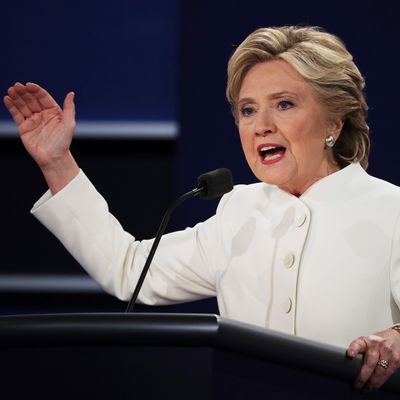
In developmental psychology, one of the most compelling and widely cited findings is that of “mind-sets.” Coined by Stanford professor Carol Dweck in a super-influential 1975 paper and later expanded on in a big-time, Bill Gates–beloved book, the theory states that children (and adults) learn one of two ways to think about the way success is realized. In a “fixed mind-set,” success comes to those who are innately gifted, and it’s a confirmation of one’s natural abilities. Having to put effort in is shameful — it means that you weren’t good enough from the start — and failure is a sign that you never had it in you. With a “growth mind-set,” success is the result of effort, and it’s a sign that you tried hard. Not meeting your goals means that you should have prepared more, so setbacks are more feedback than failure. Depending on your perspective, winning is either a gift from God or the result of putting your nose to the grindstone.
Over the years, these mind-sets have shown to have all sorts of divergent outcomes. A growth mind-set predicts everything from upward-trending math grades for junior-high students to greater employee engagement in companies. It also helps explain whether or not you think romantic relationships and sexual chemistry occur by some genetic or kismetic pre-destiny or things that you need to cultivate and gain fluency in.
Which brings us, as all things do these days, to Donald Trump and Hillary Clinton. In yet another way the two are foils to one another, the two candidates model the mind-sets to mythic, dichotomous proportions.
“I’m a big believer in natural ability,” Trump told biographer Michael D’Antonio in a piece for the Los Angeles Times titled “Donald Trump believes he was born to be king.” In D’Antonio’s estimation, Trump thinks he excels at golf, business, real estate, and beyond because of his genetic gifts. (It could also be why he tends toward ableism.) “If Obama had that psychology, Putin wouldn’t be eating his lunch. He doesn’t have that psychology and he never will because it’s not in his DNA,” he reportedly said, adding, later in their discussion, “I believe in being prepared and all that stuff. But in many respects, the most important thing is an innate ability.” This is textbook fixed mind-set, and it’s reflected in the way he approached the debates.
In a preview of the first contest, CNN’s Dan Merica reported that Trump didn’t want to “overprepare”: While he might have met with advisers beforehand, he’d rather just trust his instincts. “I believe you can prep too much for those things,” he told the New York Times. “It can be dangerous. You can sound scripted or phony — like you’re trying to be someone you’re not.”
Meanwhile, though the first contest was Clinton’s 40th (!) televised debate, she still spent four days preparing instead of campaigning. Her debate prep reportedly included talking with Trump’s ghostwriter for The Art of the Deal to ferret out his greatest insecurities, consulting with psychologists to build a model of his personality, and doing forensic analysis of Trump’s performances in the primaries, looking for the triggers that led him to, in the words of the Times, “lash out in less-than-presidential ways.” She honed her strategy with high-powered debate coach Karen Dunn and her team of handlers, crafting “moments” of prepackaged one-liners — like, one would assume, the Alicia Machado barb that turned Trump predictably apoplectic.
Ahead of the third debate, Trump mocked not only Clinton’s emphasis on mastering the material, but getting enough rest. “You know what the debate prep is? It’s resting. It’s lying down, going to sleep,” he said at an event in Colorado Springs. “She’s doing debate prep. … Sort of funny. She’s been doing this for 30 years. Now she has to do debate prep for five days.”
As you may recall, the candidates were neck-and-neck before the first debate. Not so anymore: Nate Silver has Clinton up 1.5 points after the first contest, 5.6 points after the second, and 7.1 after the third — giving her a 86.9 percent shot at winning the presidency. Fellow political cognoscenti Ezra Klein summarized it thusly: “Hillary Clinton crushed Donald Trump in the most effective series of debate performances in modern political history.” While there are obviously tons of factors contributing to these outcomes — like temperament, for instance — it’s astonishing how much the way Trump and Clinton regard preparation drove their performance. It reveals a lot about how they think about success: Either you’re born with it, or it’s something you have to earn.

